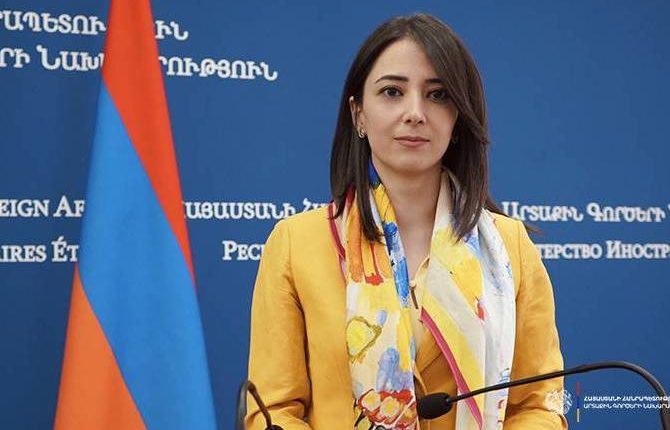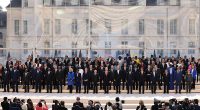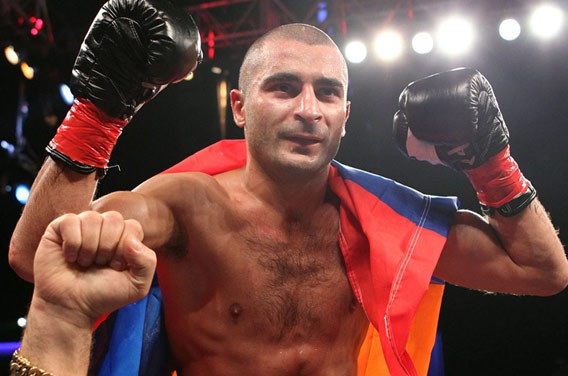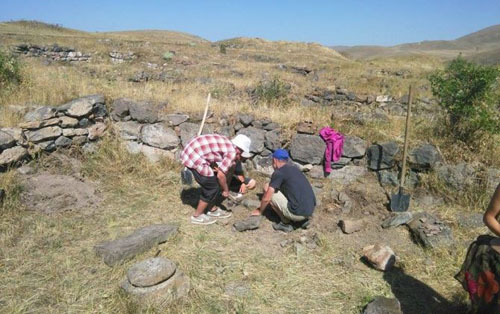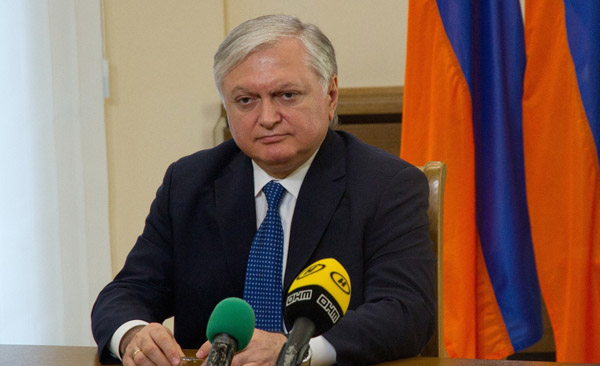YEREVAN — Azerbaijani President Ilham Aliyev issued new threats of military action against Armenia on Friday, accusing Yerevan of playing “dangerous games” despite repeated offers to sign a peace deal with Baku.
“Let them not forget about the second Karabakh war,” Aliyev said during a visit to Jebrail, a town just south of Nagorno-Karabakh captured by Azerbaijan during the 2020 war. “Let them not forget how they begged for mercy on their knees, appealing to Russia at the highest level ten times a day, asking to stop the war. Let them not forget about the anti-terror operation [of September 2023 in Karabakh].”
“We achieved what we wanted without fearing anyone, without reckoning with anyone,” he said, just over a week after the Armenian and Azerbaijani foreign ministers pledged to “put additional efforts” toward peace during talks hosted by U.S. Secretary of State Antony Blinken in New York.
Aliyev went on to criticize Blinken for a joint letter by six dozen U.S. lawmakers accusing Azerbaijan of carrying out ethnic cleansing in Karabakh and urging Washington to impose sanctions. He also condemned France, which has signed several arms deals with Armenia over the past year.
“I also warn Armenia to stop those dangerous games,” he said. “On the one hand, they talk about peace; on the other hand, they arm themselves heavily. Who gives them weapons? France and similar anti-Azerbaijani countries. Why do they supply those weapons? No matter how hard they try, they will not achieve anything.”
The Armenian Foreign Ministry responded to Aliyev later in the day, questioning whether Baku is “abandoning the peace agenda” and “preparing aggression” against Armenia.
“Armenia acquires weapons and equipment solely to exercise its right to self-defense and to protect its citizens,” the spokesperson for the Armenian Foreign Ministry, Ani Badalyan, told Armenpress in response to a question regarding Aliyev’s remarks.
“Yerevan has reiterated many times—at the highest levels—that it harbors no aggressive intentions toward any neighbor, recognizes the territorial integrity of all of them, and has no territorial claims,” Badalyan said.
The Armenian Foreign Ministry spokesperson also emphasized that the recent decision of the Constitutional Court of Armenia confirmed the compliance of the regulations governing the joint activities of the Armenian and Azerbaijani border delimitation commissions with the Armenian Constitution, rejecting any claims that the Constitution contains territorial claims against its neighbors.
“Armenia has also stated that, although some of its territories are occupied by Azerbaijan, it has no intention or agenda to return these territories by military means, because the aforementioned regulation of the joint activities of the border delimitation commissions provides all the opportunities to address and resolve these problems peacefully and through negotiations.”
Regarding weapons, the UN Charter grants each country the right to self-defense. Additionally, international law imposes an obligation on every nation to protect its citizens. “Armenia acquires weapons and equipment solely to exercise its right to self-defense and fulfill its responsibility to protect its citizens. Meanwhile, Azerbaijan’s arsenal of offensive weapons far exceeds that of Armenia, as is often stated by the President of Azerbaijan.”
“Now, considering all this, the question arises: Why does Azerbaijan emphasize the points mentioned in the previous question? Is it preparing for aggression against Armenia?”
The Armenian Foreign Ministry spokesperson stated that it is important to seek an answer to this question, as it will help assess concerns that Azerbaijan may use the upcoming COP29 conference in Baku as a smokescreen to launch new military aggression against Armenia and to distribute its political accountability among the foreign leaders who traveled to Baku to participate in COP29.
“Baku’s recent statements raise several important questions,” the Armenian Foreign Ministry spokesperson said, raising two more:
- a) Does Azerbaijan reject the agreements to recognize the territorial integrity and sovereignty of Armenia based on the Alma-Ata Declaration of 1991? In this regard, Badalyan emphasized once again that Armenia reaffirms its loyalty to the agreement reached with Azerbaijan on the basis of the Alma-Ata Declaration—to recognize each other’s territorial integrity and sovereignty along the administrative borders of the former Soviet republics.
- b) Does Azerbaijan abandon the peace agenda? On this matter, the Foreign Ministry spokesperson said that Armenia reaffirms its commitment to the peace agenda and its readiness to sign the content of the already agreed peace treaty with Azerbaijan, as announced by the Prime Minister of Armenia during his speech at the recent 79th session of the UN General Assembly in New York.
“We believe that instead of aggressive rhetoric, we should focus on resolving the issue of signing the peace treaty as soon as possible and negotiating on other issues, not only in de facto but also in de jure peace conditions.”

